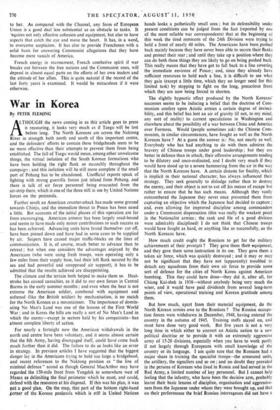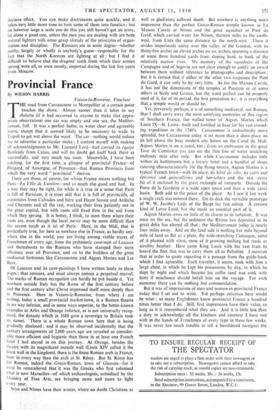War in Korea
By PETER FLEMING ALTHOUGH the news coming in as thii article goes to press is reassuring, it looks very much as if Taegu will be lost before long. The North Koreans are across the Naktong River in strength both north and south of this important centre, and the defenders' efforts to contain these bridgeheads seem to be no more effective than their attempts to prevent them from being established. The fall of Taegu would mean, among other unwelcome things, the virtual isolation of the South Korean formations who have been holding the right flank so staunchly throughout the campaign ; and this isolation will be still more complete if the small port of Pohang has to be abandoned. Unofficial reports speak of fighting with strong guerrilla forces just inland from Pohang, and there is talk of air force personnel being evacuated from the air-strip there, which is one of the three still in use by United Nations forces on the peninsula.
Further south an American counter-attack has made some ground towards Chinju, and the immediate threat to Pusan has been eased a little. But accounts of the initial phases of this operation are far from encouraging. American armour has been largely road-bound and seems to have made only minor contributions to such success as has been achieved. Advancing units have found themselves cut off, have been pinned down and have had in some cases to be supplied by air. Snipers have caused major traffic-blocks on the lines of communication. It is, of course, much better to advance than to retreat ; but when one considers the advantages enjoyed by the Americans (who were using fresh troops, were operating only a few miles from their supply base, had their left flank secured by the sea and had powerful and unopposed air support), it has to be admitted that the results achieved are disappointing.
The climate and the terrain both helped to make them so. Heat- stroke has caused casualties, as it did to our own forces in Central Burma in the early summer months ; and even when the heat is not extreme the American soldier, cumbered with equipment and softened (like the British soldier) by mechanisation, is no match for the North Korean as a mountaineer. The importance of domin- ating No Man's Land was one of the lessons of the First World War ; and in Korea the hills are really a sort of No Man's Land in which the enemy—except in sectors held by his compatriots—has almost complete liberty of action.
For nearly a fortnight now the American withdrawals in the north and centre have been voluntary, and it seems almost certain that the 8th Army, having disengaged itself, could have( come back much further than it did. The failure to do so looks like an error in strategy. In previous articles I have suggested that the biggest danger lay in the Americans trying to hold too large a bridgehead, and recent references to the Naktong position as " the line of minimal defence " sound as though General MacArthur may have regarded the 150-mile front from Yongdok to somewhere west of Masan as delimiting the final perimeter which he must, and could, defend with the resources at his disposal. If this was his plan, it was lug a good plan. On the map, that part of the bottom right-hand tomer of the Korean peninsula which is still in United Nations hands looks a pathetically small area ; but its defensibility under present conditions can be judged from the fact (reported by one of the most reliable war correspondents) that at the beginning of this week the tired remnants of the 24th Division were trying to hold a front of nearly 40 miles. The Americans have been pushed back mainly because they have never been able to secure their flanks and protect their rear ; and until they take up a position where they can do both these things they are likely -to go on being pushed back. This really means that they have got to fall back to a line covering the immediate environs of Pusan ; and, since they already have sufficient resources to hold' such a line, it is difficult to see what they gain (except a little time, which they no longer need for this limited task) by stopping to fight on the long, precarious front which they are now being forced to shorten.
The slightly hypnotic effect produced by the North Koreans' successes seems to be inducing a belief that the doctrine of Com- munism confers upon Asiatic armies a certain degree of invinci- bility, and this belief has lent an air of gravity (if not, to my mind, any sort of reality) to current speculations in Washington and elsewhere about the possibility of a war between China and America over Formosa. Would (people sometimes ask) the Chinese Com- munists, in similar circumstances, have fought as well as the. North Koreans have ? At a guess the answer is: No, not nearly as well. Everybody who has had anything to do with them admires the bravery of Chinese troops under good leadership ; but they are better in defence than in attack, their offensive arrangements tending to be dilatory and unco-ordinated, and I doubt very much if they would have stood up to a severe hammering from the air in the way that the North Koreans have. A certain distaste for finality, which is implicit in their national character, has always influenced their strategy. They seek generally to dislodge rather than to destroy the enemy, and their object is not to cut off his means of escape but rather to ensure that he has such means. Although they vastly outnumbered the Japanese they never once prevented them from capturing an objective which the. Japanese had decided to capture ; and, even allowing for improved discipline among commanders under a Communist dispensation (this was really the weakest point in the Nationalist armies ; the rank and file of a good division were admirably disciplined) I do not think that Chinese troops would have fought as hard, or anything like as successfully, as the North , Koreans have.
HOw much credit ought the Russians to get 'for the military achievements of their proteges? They gave them their equipment, and they gave them some instruction in its use. They gave them a token air force, which was quickly destroyed ; and it may or may not be significant that they have not (apparently) troubled to detach any squadrons from their own air force to provide some sort of defence for the cities of North Korea against American bombing. This they could have done—they did it, after all, for Chiang Kai-shek in 1938—without anybody being very much the wiser, and it would have paid dividends from several long-term points of view, operational training and Korean, gratitude among them.
But how much, apart from their material equipment, do the North Korean armies owe to the Russians ? The Russian occupa- tion forces were withdrawn in December, 1948, having entered the country in the autumn of 1945. Training staffs stayed on, and must have done very good work. But five years is not a very long time in which either to convert an Asiatic nation to a new political doctrine or to provide it with an extremely aggressive army of 15-20 divisions, especially when you have to work partly if not largely through Europeans with small knowledge of the country or its language. I am quite sure that the Russians had a major share in training the specialist troops—the armoured units, the artillery, the signallers and so on ; and no doubt they provided in the persons of Koreans who lived in Russia and had served in the Red Army, a limited number of key personnel. But I cannot help feeling that the infantry, who have been the decisive arm, probably learnt their basic lessons of discipline, organisation and aggressive- ness from the Japanese under whom they Were brought up, and that on their performance the brief Russian interregnum did not have a decisive-effect. You can make doctrinaires quite quickly, and it takes very little more time to turn some of them into fanatics ; but on however large a scale you do this you still haven't got an army, let alone a good one, unless the men you are dealing with are both natural fighters with some grasp already of the principles of organ- isation and discipline. The Russians are in some degree—whether partly, largely or wholly is anybody's guess—responsible for the fact that the North Koreans are fighting at all ; but I find it difficult to believe that the dragons' teeth from which their armies sprang were all, or even mostly, imported during 'the last five years from Moscow.



































 Previous page
Previous page